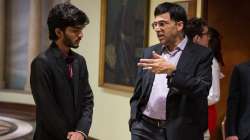When a chess player is called Grandmaster? Eligibility, criteria, list of Chess Grandmasters from India
Five-time world champion Vishwanathan Anand was the first Indian chess player to win the Grandmaster title in 1988 and since then 82 Indian players have won the most prestigious Chess title award.

Viswanathan Anand was the first Indian chess player to win the Grandmaster title in 1988 and then the popularity of the game in India increased rapidly. Since Anand's historic achievement, a total of 83 Indian players have won the Grandmaster title.
Vuppala Prraneeth, the 16-year-old Chess player from India, is the latest entrant in India's growing Grandmasters list. Apart from Prraneeth, Koustav Chatterjee, Vignesh NR, and Sayantan Das are three Indian players who won the prestigious title in 2023.
However, only two Indian female players, Koneru Humpy and Harika Dronavalli, have won the Women's Grandmaster title so far. Rameshbabu Praggnanandhaa won the Grandmaster title at the age of 12 in 2018 and then beat the current world no.1 Carlsen Magnus in 2022, at the age of 16.
What is Grandmaster?
Apart from a world champion, Grandmaster is the highest individual title a professional chess player can attain. International Chess Federation (FIDE) created this title in 1950 and awarded it to 27 players with no written criteria at the time. Since then, 2027 players have won the Grandmaster title, including 83 from India. Surprisingly, only 40 female chess players have managed to win this prestigious title in 73 years.
Eligibility and Criteria to Become Grandmaster
- A player must have an Elo rating (Measurement of skills in Chess) of at least 2500 at any point in his/her career.
- A player must achieve three favourable results from a total of at least 27 games in the tournament.
- At least one result must come at the Swiss Tournament with at least 40 participating players with an average Elo rating of 2000-plus.
- The player's Elo rating at the end of the tournament must be at least 2600.
- A player's opponent must have an average Elo rating of 2380.
- At least 33% of the player's opponents must be Grandmasters.
- At least 55% of the player's opponents must hold Fide titles other than Candidate Master and Woman Candidate Master.
- A player's opponents must come from at least three different chess federations (can include from player's own federation)
Apart from the above regulations, a player with peak Elo ratings of 2300 can win the Grandmaster title without any criteria if he/she wins the Women's World Championship, the World Junior Championship, the World Senior Championship, or a Continental Chess Championship.
List of Chess Grandmasters from India
Viswanathan Anand, Tamil Nadu, 1988
Dibyendu Barua, West Bengal, 1991
Praveen Thipsay, Maharashtra, 1997
Abhijit Kunte, Maharashtra, 2000
Krishnan Sasikiran, Tamil Nadu, 2000
Pentala Harikrishna, Andhra Pradesh, 2001
Koneru Humpy, Andhra Pradesh, 2002
Surya Shekhar Ganguly, West Bengal, 2003
Sandipan Chanda, West Bengal, 2003
Ramachandran Ramesh, Tamil Nadu, 2003
Tejas Bakre, Gujarat, 2004
Magesh Chandran Panchanathan, Tamil Nadu, 2006
J. Deepan Chakkravarthy, Tamil Nadu, 2006
Neelotpal Das, West Bengal, 2006
Parimarjan Negi, Delhi, 2006
Geetha Narayanan Gopal, Kerala, 2007
Abhijeet Gupta, Delhi, 2008
Subramanian Arun Prasad, Tamil Nadu, 2008
Sundararajan Kidambi, Tamil Nadu, 2009
R. R. Laxman, Tamil Nadu, 2009
Sriram Jha, Delhi, 2010
Deep Sengupta, West Bengal, 2010
Baskaran Adhiban, Tamil Nadu, 2010
S. P. Sethuraman, Tamil Nadu, 2011
Harika Dronavalli, Andhra Pradesh, 2011
M. R. Lalith Babu, Andhra Pradesh, 2012
Vaibhav Suri, Delhi, 2012
M. R. Venkatesh ,Tamil Nadu, 2012
Sahaj Grover, Delhi, 2012
Vidit Gujrathi, Maharashtra, 2013
M. Shyam Sundar, Tamil Nadu, 2013
Akshayraj Kore, Maharashtra, 2013
V. Vishnu Prasanna, Tamil Nadu, 2013
Debashis Das, Odisha, 2013
Saptarshi Roy Chowdhury, West Bengal, 2013
Ankit Rajpara, Gujarat, 2014
Chithambaram Aravindh, Tamil Nadu, 2015
Karthikeyan Murali, Tamil Nadu, 2015
Ashwin Jayaram, Tamil Nadu, 2015
Swapnil Dhopade, Maharashtra, 2016
S. L. Narayanan, Kerala, 2016
Shardul Gagare, Maharashtra, 2016
Diptayan Ghosh, West Bengal, 2016
Priyadharshan Kannappan, Tamil Nadu, 2016
Aryan Chopra, Delhi, 2017
Srinath Narayanan, Tamil Nadu, 2017
Himanshu Sharma, Haryana, 2017
Anurag Mhamal, Goa, 2017
Abhimanyu Puranik, Maharashtra, 2017
M. S. Thejkumar Karnataka 2017
Saptarshi Roy, West Bengal, 2018
Rameshbabu Praggnanandhaa, Tamil Nadu, 2018
Nihal Sarin, Kerala 2018
Arjun Erigaisi, Telangana, 2018
Karthik Venkataraman, Andhra Pradesh, 2018
Harsha Bharathakoti, Telangana, 2019
P. Karthikeyan, Tamil Nadu, 2019
Stany G.A., Karnataka, 2019
N. R. Visakh, Tamil Nadu, 2019
Gukesh D, Tamil Nadu, 2019
P. Iniyan, Tamil Nadu, 2019
Swayams Mishra, Odisha, 2019
Girish A. Koushik, Karnataka, 2019
Prithu Gupta, Delhi, 2019
Raunak Sadhwani, Maharashtra, 2019
G. Akash, Tamil Nadu, 2020
Leon Luke Mendonca, Goa, 2020
Arjun Kalyan, Maharashtra, 2021
Raja Rithvik R, Telangana, 2021
Mitrabha Guha, West Bengal, 2021
Sankalp Gupta, Maharashtra, 2021
Bharath Subramaniyam, Tamil Nadu, 2022
Rahul Srivatshav, Telangana, 2022
Pranav V, Tamil Nadu, 2022
Koustav Chatterjee, West Bengal, 2023
Vignesh NR, Chennai, 2023
Sayantan Das, West Bengal, 2023
Vuppala Prraneeth, Telangana, 2023
Aditya Samant, Maharashtra, 2023
